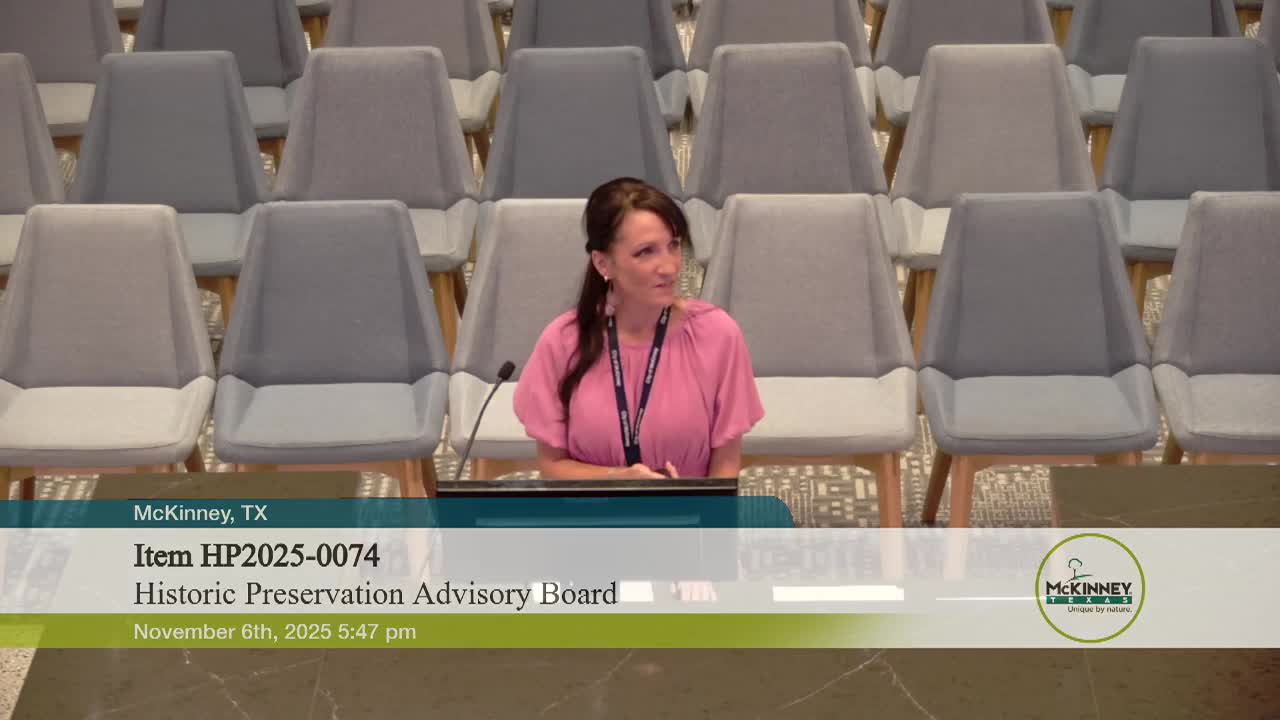Historic board denies demolition request for 1505 W. Louisiana St.; owners cited health and structural concerns
Get AI-powered insights, summaries, and transcripts
Subscribe
Summary
The City of McKinney Historic Preservation Advisory Board on Nov. 6 denied a request to demolish the residence at 1505 W. Louisiana St., voting 6 to 1 after extended public testimony and technical reports were discussed.
The City of McKinney Historic Preservation Advisory Board on Nov. 6 denied a request to demolish the residence at 1505 W. Louisiana St., voting 6 to 1 after extended public testimony and technical reports were discussed.
Staff presented the demolition request and the supporting reports. Staff’s packet described structural damage and environmental concerns: walls out of plumb on average 1½ to 2½ inches (with repeated measurements up to 4½ inches), floors out of level 2–3 inches, one corner as much as 6.75 inches out of level, compromised roof‑to‑foundation connections, and elevated interior mold spore readings. Staff recommended approval of the certificate of appropriateness for demolition based on those conditions.
Homeowner Travis Hohfeldt told the board he bought the house in July 2025 and said additional damage was discovered during planned interior work. Hohfeldt said his wife requires mobility accommodations and has an immune‑suppressing medication; he said elevated spore counts in the house posed a health risk and that the couple’s goal was an accessible home near the downtown square. "With her, MS, she also has a suppressed immune system… the spores and some of those types of things present a significant risk to her health," Hohfeldt said.
Contractor Shannon Kane, who has done local historic work, described poor grading and ongoing water intrusion beneath the house as the likely driver of foundation movement. Kane said prior repairs—concrete piers and a vapor barrier—had not halted deterioration and that further conventional leveling would likely cause additional damage to the structure. Kane also said some historic interior materials (notably floorboards) could be salvaged even if the structure could not be practically restored.
A structural evaluation included in the packet concluded that foundation repairs already completed had achieved the best possible outcome without further destabilization and that many rooms remained significantly out of level; the report also noted electrical and subfloor concerns and recommended that the building be treated as having compromised structural components.
Several board members said they were reluctant to approve demolition without exhausting alternatives. Members referenced the preservation guidance used locally and federally—commonly the U.S. Secretary of the Interior’s standards—and emphasized that demolition is typically a last resort for properties that retain historic integrity. Board members noted the house’s location at the entrance to the historic district and that the property’s priority rating had changed in a recent survey.
After deliberation, Board Member Petkisic moved to deny the certificate of appropriateness for demolition; the motion was seconded by Prior Robertson. The board chair announced the motion carried 6–1, with one member voting to approve. The denial preserves the house’s status within the historic district; the owners may pursue other regulatory avenues or future applications if they choose to seek a different outcome.
The meeting record includes the staff reports, the structural engineer’s letter, and the mold report in the packet. The board noted homeowners and their contractor had discussed possible salvage of interior materials but found that, given the board’s preservation responsibilities, demolition had not been sufficiently demonstrated as the only viable option.
